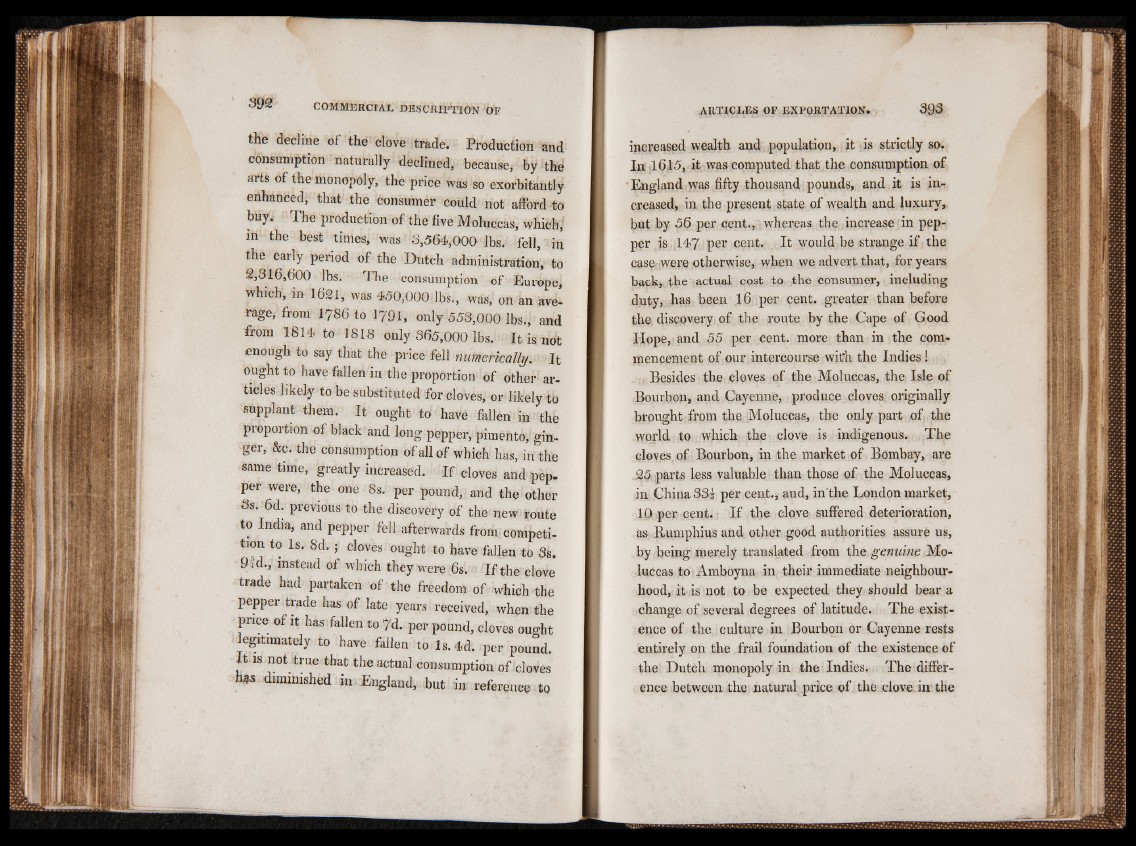
the decline of the clove trade. Production and
consumption naturally declined, because, by the
arts of the monopoly, the price was so exorbitantly
enhanced, that the consumer could not afford to
buy. The production of the five Moluccas, which,
m the best times, was 3,564,000 lbs. fell, in
the early period of the Dutch administration, to
2,516,600 lbs. The consumption of Europe,
which, in 1621, was 450,000 lbs, was, on an average,
from 1786 to D/91, only 553,000 lbs, and
from 1814 to 1818 only 365,000 lbs. I t is not
enough to say that the price fell numerically. It
ought to have fallen in the proportion of other articles
likely to be substituted for cloves, or likely to
supplant them. It ought to have fallen in the
proportion of black and long pepper, pimento, ginger,
&c. the consumption of all of which has, in the
same time, greatly increased. If cloves and pep.
per were, the one 8s. per pound, and the other
3s. 6d. previous to the discovery of the new route
to India, and pepper fell afterwards from-competition
to Is. 8d. ; cloves ought to have fallen to 3 s.
&Id, instead of which they were 6s. If the clove
trade had partaken of the freedom of which the
pepper trade has of late years received, when the
price of it has fallen to 7 d. per pound, cloves ought
legitimately to have fallen to ls.4 d. per pound.
It is not true that the actual consumption of cloves
has diminished in England, but in reference to
increased wealth and population, it is strictly so.
In ¡1615, it was computed that the consumption of
E n gland was fifty thousand pounds, and it is increased,
in the present state of wealth and luxury,
but by 56 per cent, whereas the increase in pepper
is 147 per cent. It would be strange if the
case were otherwise, when we advert that, for years
back, the actual cost to the consumer, including
duty, has been 16 per cent, greater than before
the discovery of the route by the Cape of Good
Hope, and 55 per cent, more than in the commencement
of our intercourse with the Indies!
I Besides the cloves of the Moluccas, the Isle of
Bourbon, and Cayenne, produce cloves originally
brought from the Moluccas, the only part of the
world to which the clove is indigenous. The
cloyes of Bourbon, in the market of Bombay, are
25 parts less valuable than those of the Moluccas,
in China 333 per cent, and, in'the London market,
10 per cent. If the clove suffered deterioration,
as Rumphius and other good authorities assure us,
by being merely translated from the genuine Moluccas
to Amboyna in their immediate neighbourhood,
it is not to be expected they should bear a
change of several degrees of latitude. The existence
of the culture in Bourbon or Cayenne rests
entirely on the frail foundation of the existence of
the Dutch monopoly in the Indies. The difference
between the natural price of the clove in the